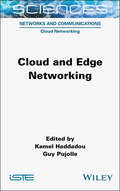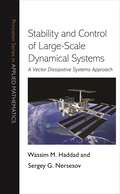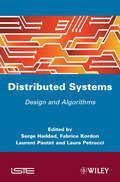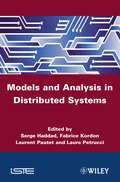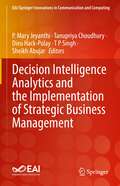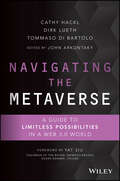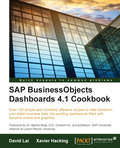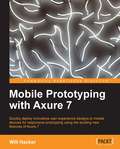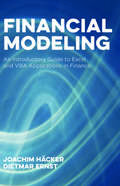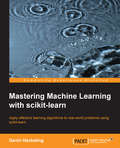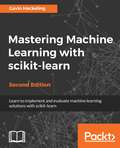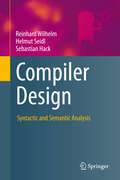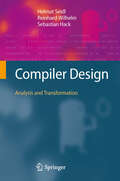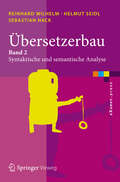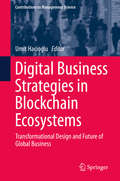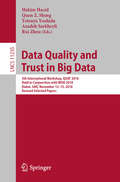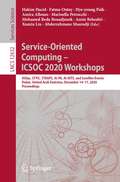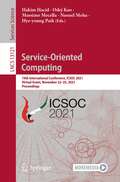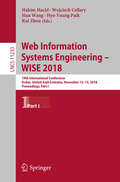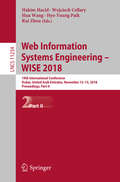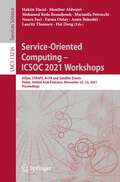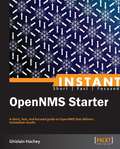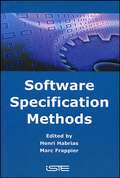- Table View
- List View
Recent Advances in Agent-Based Negotiation: Applications and Competition Challenges (Studies in Computational Intelligence #1092)
by Rafik Hadfi Reyhan Aydoğan Takayuki Ito Ryuta ArisakaThis book comprises carefully selected and reviewed outcomes of the 13th International Workshop on Automated Negotiations (ACAN) held in Vienna, 2022, in conjunction with International Joint Conference on Artificial Intelligence (IJCAI) 2022. It focuses on the applications and challenges of agent-based negotiation including agreement technology, mechanism design, electronic commerce, recommender systems, supply chain management, social choice theory, and others. This book is intended for the academic and industrial researchers of various communities of autonomous agents and multi-agent systems, as well as graduate students studying in those areas or having interest in them.
Cloud and Edge Networking
by Kamel Haddadou Guy PujolleA major transformation in the world of networks is underway, as the focus shifts from physical technology to software-based solutions. In this book, the authors present this new generation of networks that are based in the Cloud by detailing the transition from a complex environment to a simple digital infrastructure. This infrastructure brings together connected devices, the antennas that collect radio waves, the optical fibers that carry signals and the data center that handles all of the different processes. From this perspective, the data center becomes the brain, managing network services, controls, automation, intelligence, security and other applications. This architecture is relevant to carrier networks, the Internet of Things, enterprise networks and the global networks of the major Internet companies. Cloud and Edge Networking further discusses developments at the border of networks, the Edge, where data is processed as near as possible to the source. Over the next ten years, the Edge will become a major strategic factor.
Stability and Control of Large-Scale Dynamical Systems: A Vector Dissipative Systems Approach (Princeton Series in Applied Mathematics #41)
by Wassim M. Haddad Sergey G. NersesovModern complex large-scale dynamical systems exist in virtually every aspect of science and engineering, and are associated with a wide variety of physical, technological, environmental, and social phenomena, including aerospace, power, communications, and network systems, to name just a few. This book develops a general stability analysis and control design framework for nonlinear large-scale interconnected dynamical systems, and presents the most complete treatment on vector Lyapunov function methods, vector dissipativity theory, and decentralized control architectures. Large-scale dynamical systems are strongly interconnected and consist of interacting subsystems exchanging matter, energy, or information with the environment. The sheer size, or dimensionality, of these systems necessitates decentralized analysis and control system synthesis methods for their analysis and design. Written in a theorem-proof format with examples to illustrate new concepts, this book addresses continuous-time, discrete-time, and hybrid large-scale systems. It develops finite-time stability and finite-time decentralized stabilization, thermodynamic modeling, maximum entropy control, and energy-based decentralized control. This book will interest applied mathematicians, dynamical systems theorists, control theorists, and engineers, and anyone seeking a fundamental and comprehensive understanding of large-scale interconnected dynamical systems and control.
Distibuted Systems: Design and Algorithms (Wiley-iste Ser.)
by Serge Haddad Fabrice Kordon Laurent Pautet Laure PetrucciIn today’s digital environment, distributed systems are increasingly present in a wide variety of environments, ranging from public software applications to critical systems. Distributed Systems introduces the underlying concepts, the associated design techniques and the related security issues. Distributed Systems: Design and Algorithms, is dedicated to engineers, students, and anyone familiar with algorithms and programming, who want to know more about distributed systems. These systems are characterized by: several components with one or more threads, possibly running on different processors; asynchronous communications with possible additional assumptions (reliability, order preserving, etc.); local views for every component and no shared data between components. This title presents distributed systems from a point of view dedicated to their design and their main principles: the main algorithms are described and placed in their application context, i.e. consistency management and the way they are used in distributed file-systems.
Models and Analysis for Distributed Systems (Wiley-iste Ser.)
by Serge Haddad Fabrice Kordon Laurent Pautet Laure PetrucciNowadays, distributed systems are increasingly present, for public software applications as well as critical systems. software applications as well as critical systems. This title and Distributed Systems: Design and Algorithms – from the same editors – introduce the underlying concepts, the associated design techniques and the related security issues. The objective of this book is to describe the state of the art of the formal methods for the analysis of distributed systems. Numerous issues remain open and are the topics of major research projects. One current research trend consists of profoundly mixing the design, modeling, verification and implementation stages. This prototyping-based approach is centered around the concept of model refinement. This book is more specifically intended for readers that wish to gain an overview of the application of formal methods in the design of distributed systems. Master’s and PhD students, as well as engineers in industry, will find a global understanding of the techniques as well as references to the most up-to-date works in this area.
Decision Intelligence Analytics and the Implementation of Strategic Business Management (EAI/Springer Innovations in Communication and Computing)
by Dieu Hack-Polay Tanupriya Choudhury P. Mary Jeyanthi T P Singh Sheikh AbujarThis book presents a framework for developing an analytics strategy that includes a range of activities, from problem definition and data collection to data warehousing, analysis, and decision making. The authors examine best practices in team analytics strategies such as player evaluation, game strategy, and training and performance. They also explore the way in which organizations can use analytics to drive additional revenue and operate more efficiently. The authors provide keys to building and organizing a decision intelligence analytics that delivers insights into all parts of an organization. The book examines the criteria and tools for evaluating and selecting decision intelligence analytics technologies and the applicability of strategies for fostering a culture that prioritizes data-driven decision making. Each chapter is carefully segmented to enable the reader to gain knowledge in business intelligence, decision making and artificial intelligence in a strategic management context.
Navigating the Metaverse: A Guide to Limitless Possibilities in a Web 3.0 World
by Cathy Hackl Dirk Lueth Tommaso Di BartoloJump into the metaverse to connect with consumers and explore endless opportunities Like the Internet before it, the metaverse is a virtual space bringing people, companies, and products together in both digital and real environments to create new economic opportunities. The groundwork is already laid. People and organizations jumping in are gaining invaluable experience, meeting customers, developing revenue streams, and even shaping metaverse culture. In Navigating the Metaverse: A Guide to Limitless Business Possibilities in a Web 3.0 World, a team of Silicon Valley thought leaders delivers a groundbreaking discussion of how to find the right opportunities in this fast-moving universe. You'll explore everything from the metaverse basics, to strategy, to launching your first metaverse project. In the book, you'll find: Data and market analysis to erase any doubt that the metaverse is the next big thing. Foundational knowledge about the metaverse, metaverse economy, Web3 technology, and more. The essential connection between metaverse environments, businesses, community, and digital products that make the metaverse economy so powerful. A deep dive on non-fungible tokens (NFTs) and how to make the most of these assets. Frameworks to help find, nurture, measure, and capitalize on innovation in the metaverse. An essential breakdown of the next stage in online business, Navigating the Metaverse belongs in the libraries of entrepreneurs, executives, and innovators looking to lead in the new age of online business and commerce.
SAP BusinessObjects Dashboards 4.0 Cookbook
by Xavier Hacking David LaiThis guide to SAP BusinessObjects Dashboards 4.0 (formerly Xcelsius )is a cookbook packed full of practical recipes written in a clear, concise manner with annotated examples to empower readers to quickly accomplish specific dashboard tasks. If you are a developer with a good command and knowledge of creating dashboards, but are not yet an advanced Dashboard Design user, then this is the perfect book for you. You should have a good working knowledge of Microsoft Excel as well as knowledge of basic dashboard practices, though experience of Dashboard Design as a specific dashboard tool is not essential.
Mobile Prototyping with Axure 7
by Will HackerThis book is a step-by-step tutorial which includes hands-on examples and downloadable Axure files to get you started with mobile prototyping immediately. You will learn how to develop an application from scratch, and will be guided through each and every step.If you are a mobile-centric developer/designer, or someone who would like to take their Axure prototyping skills to the next level and start designing and testing mobile prototypes, this book is ideal for you. You should be familiar with prototyping and Axure specifically, before you read this book.
Prentice Hall Technology Education: Learning by Design, Revised Edition
by Michael Hacker Dave BurghardtNIMAC-sourced textbook
Financial Modeling
by Joachim Häcker Dietmar ErnstNachvollziehbare Modelle zur Beurteilung komplexer Finanzprodukte. Die Autoren bieten Studenten einen anwendungsorientierten Leitfaden zu den zentralen Themenkomplexen Corporate Finance, Derivate und Portfoliomanagement. Zwei Workshops zu Microsoft Excel(r) und der Programmiersprache VBA(r) komplettieren das finanzwirtschaftliche Know-how. Der Kurscharakter des Buches und die praxisnahen Beispiele, die zusatzlich als Download-Angebot zur Verfugung stehen, ermoglichen ein schnelles und interaktives Lernen. Als Nachschlagewerk leistet der Band auch Praktikern wertvolle Dienste. "
Mastering Machine Learning with scikit-learn
by Gavin HackelingIf you are a software developer who wants to learn how machine learning models work and how to apply them effectively, this book is for you. Familiarity with machine learning fundamentals and Python will be helpful, but is not essential.
Mastering Machine Learning with scikit-learn - Second Edition
by Gavin HackelingUse scikit-learn to apply machine learning to real-world problems About This Book • Master popular machine learning models including k-nearest neighbors, random forests, logistic regression, k-means, naive Bayes, and artificial neural networks • Learn how to build and evaluate performance of efficient models using scikit-learn • Practical guide to master your basics and learn from real life applications of machine learning Who This Book Is For This book is intended for software engineers who want to understand how common machine learning algorithms work and develop an intuition for how to use them, and for data scientists who want to learn about the scikit-learn API. Familiarity with machine learning fundamentals and Python are helpful, but not required. What You Will Learn • Review fundamental concepts such as bias and variance • Extract features from categorical variables, text, and images • Predict the values of continuous variables using linear regression and K Nearest Neighbors • Classify documents and images using logistic regression and support vector machines • Create ensembles of estimators using bagging and boosting techniques • Discover hidden structures in data using K-Means clustering • Evaluate the performance of machine learning systems in common tasks In Detail Machine learning is the buzzword bringing computer science and statistics together to build smart and efficient models. Using powerful algorithms and techniques offered by machine learning you can automate any analytical model. This book examines a variety of machine learning models including popular machine learning algorithms such as k-nearest neighbors, logistic regression, naive Bayes, k-means, decision trees, and artificial neural networks. It discusses data preprocessing, hyperparameter optimization, and ensemble methods. You will build systems that classify documents, recognize images, detect ads, and more. You will learn to use scikit-learn's API to extract features from categorical variables, text and images; evaluate model performance, and develop an intuition for how to improve your model's performance. By the end of this book, you will master all required concepts of scikit-learn to build efficient models at work to carry out advanced tasks with the practical approach. Style and approach This book is motivated by the belief that you do not understand something until you can describe it simply. Work through toy problems to develop your understanding of the learning algorithms and models, then apply your learnings to real-life problems.
Compiler Design: Syntactic and Semantic Analysis
by Sebastian Hack Helmut Seidl Reinhard WilhelmWhile compilers for high-level programming languages are large complex software systems, they have particular characteristics that differentiate them from other software systems. Their functionality is almost completely well-defined - ideally there exist complete precise descriptions of the source and target languages. Additional descriptions of the interfaces to the operating system, programming system and programming environment, and to other compilers and libraries are often available. This book deals with the analysis phase of translators for programming languages. It describes lexical, syntactic and semantic analysis, specification mechanisms for these tasks from the theory of formal languages, and methods for automatic generation based on the theory of automata. The authors present a conceptual translation structure, i.e., a division into a set of modules, which transform an input program into a sequence of steps in a machine program, and they then describe the interfaces between the modules. Finally, the structures of real translators are outlined. The book contains the necessary theory and advice for implementation. This book is intended for students of computer science. The book is supported throughout with examples, exercises and program fragments.
Compiler Design: Analysis and Transformation
by Sebastian Hack Helmut Seidl Reinhard WilhelmWhile compilers for high-level programming languages are large complex software systems, they have particular characteristics that differentiate them from other software systems. Their functionality is almost completely well-defined - ideally there exist complete precise descriptions of the source and target languages. Additional descriptions of the interfaces to the operating system, programming system and programming environment, and to other compilers and libraries are often available. The book deals with the optimization phase of compilers. In this phase, programs are transformed in order to increase their efficiency. To preserve the semantics of the programs in these transformations, the compiler has to meet the associated applicability conditions. These are checked using static analysis of the programs. In this book the authors systematically describe the analysis and transformation of imperative and functional programs. In addition to a detailed description of important efficiency-improving transformations, the book offers a concise introduction to the necessary concepts and methods, namely to operational semantics, lattices, and fixed-point algorithms. This book is intended for students of computer science. The book is supported throughout with examples, exercises and program fragments.
Übersetzerbau
by Sebastian Hack Helmut Seidl Reinhard WilhelmDas Buch behandelt die Analysephase von Übersetzern für Programmiersprachen. Die Autoren beschreiben die lexikalische, syntaktische und semantische Analyse sowie Spezifikationsmechanismen für diese Aufgaben aus der Theorie der formalen Sprachen und automatische Erzeugungsverfahren aus der Theorie der Automaten. Vorgestellt wird eine konzeptionelle Übersetzerstruktur, mit der ein Eingabe- in ein Maschinenprogramm transformiert wird. Das Buch enthält neben der notwendigen Theorie auch Hinweise zur Implementierung von Übersetzern.
Digital Business Strategies in Blockchain Ecosystems: Transformational Design and Future of Global Business (Contributions to Management Science)
by Umit HaciogluThis book analyzes the effects of the latest technological advances in blockchain and artificial intelligence (AI) on business operations and strategies. Adopting an interdisciplinary approach, the contributions examine new developments that change the rules of traditional management. The chapters focus mainly on blockchain technologies and digital business in the "Industry 4.0" context, covering such topics as accounting, digitalization and use of AI in business operations and cybercrime. Intended for academics, blockchain experts, students and practitioners, the book helps business strategists design a path for future opportunities.
Data Quality and Trust in Big Data: 5th International Workshop, QUAT 2018, Held in Conjunction with WISE 2018, Dubai, UAE, November 12–15, 2018, Revised Selected Papers (Lecture Notes in Computer Science #11235)
by Hakim Hacid Quan Z. Sheng Tetsuya Yoshida Azadeh Sarkheyli Rui ZhouThis book constitutes revised selected papers from the International Workshop on Data Quality and Trust in Big Data, QUAT 2018, which was held in conjunction with the International Conference on Web Information Systems Engineering, WISE 2018, in Dubai, UAE, in November 2018. The 9 papers presented in this volume were carefully reviewed and selected from 15 submissions. They deal with novel ideas and solutions related to the problems of exploring, assessing, monitoring, improving, and maintaining the quality of data and trust for Big Data.
Service-Oriented Computing – ICSOC 2020 Workshops: AIOps, CFTIC, STRAPS, AI-PA, AI-IOTS, and Satellite Events, Dubai, United Arab Emirates, December 14–17, 2020, Proceedings (Lecture Notes in Computer Science #12632)
by Hakim Hacid Fatma Outay Hye-Young Paik Amira Alloum Marinella Petrocchi Mohamed Reda Bouadjenek Amin Beheshti Xumin Liu Abderrahmane MaaradjiThis book constitutes revised and selected papers from the scientific satellite events held in conjunction with the18th International Conference on Service-Oriented Computing, ICSOC 2020. The conference was held virtually during December 14-17, 2020. A total of 125 submissions were received for the satellite events. The volume includes 9 papers from the PhD Symposium Track,4 papers from the Demonstration Track, and 45 papers from the following workshops:International Workshop on Artificial Intelligence for IT Operations (AIOps)International Workshop on Cyber Forensics and Threat Investigations Challenges in Emerging Infrastructures (CFTIC 2020)2nd Workshop on Smart Data Integration and Processing (STRAPS 2020)International Workshop on AI-enabled Process Automation (AI-PA 2020)International Workshop on Artificial Intelligence in the IoT Security Services (AI-IOTS 2020)
Service-Oriented Computing: 19th International Conference, ICSOC 2021, Virtual Event, November 22–25, 2021, Proceedings (Lecture Notes in Computer Science #13121)
by Hakim Hacid Odej Kao Massimo Mecella Naouel Moha Hye-Young PaikThis book constitutes the proceedings of the 19th International Conference on Service-Oriented Computing, ICSOC 2020, which is held virtually in November 2021.The 29 full, 28 short, and 3 vision papers included in this volume were carefully reviewed and selected from 189 submissions. They were organized in topical sections named: Blockchains and smart contracts, Architectures, microservices and APIs, Applications, Internet-of-Things, crowdsourced, social, and conversational services, Service composition and recommendation, Cloud computing, and Edge computing.
Web Information Systems Engineering – WISE 2018: 19th International Conference, Dubai, United Arab Emirates, November 12-15, 2018, Proceedings, Part I (Lecture Notes in Computer Science #11233)
by Hakim Hacid Wojciech Cellary Hua Wang Hye-Young Paik Rui ZhouThe two-volume set LNCS 11233 and LNCS 11234 constitutes the proceedings of the 19th International Conference on Web Information Systems Engineering, WISE 2018, held in Dubai, United Arab Emirates, in November 2018. The 48 full papers and 21 short papers presented were carefully reviewed and selected from 209 submissions. The papers are organized in topical sections on blockchain, security, social network and security, social network, microblog data analysis, graph data, information extraction, text mining, recommender systems, medical data analysis, Web services and cloud computing, data stream and distributed computing, data mining techniques, entity linkage and semantics, Web applications, and data mining applications.
Web Information Systems Engineering – WISE 2018: 19th International Conference, Dubai, United Arab Emirates, November 12-15, 2018, Proceedings, Part II (Lecture Notes in Computer Science #11234)
by Hakim Hacid Wojciech Cellary Hua Wang Hye-Young Paik Rui ZhouThe two-volume set LNCS 11233 and LNCS 11234 constitutes the proceedings of the 19th International Conference on Web Information Systems Engineering, WISE 2018, held in Dubai, United Arab Emirates, in November 2018. The 48 full papers and 21 short papers presented were carefully reviewed and selected from 209 submissions. The papers are organized in topical sections on blockchain, security, social network and security, social network, microblog data analysis, graph data, information extraction, text mining, recommender systems, medical data analysis, Web services and cloud computing, data stream and distributed computing, data mining techniques, entity linkage and semantics, Web applications, and data mining applications.
Service-Oriented Computing – ICSOC 2021 Workshops: AIOps, STRAPS, AI-PA and Satellite Events, Dubai, United Arab Emirates, November 22–25, 2021, Proceedings (Lecture Notes in Computer Science #13236)
by Hakim Hacid Monther Aldwairi Mohamed Reda Bouadjenek Marinella Petrocchi Noura Faci Fatma Outay Amin Beheshti Lauritz Thamsen Hai DongThis book constitutes the selected papers from the scientific satellite events held in conjunction with the19th International Conference on Service-Oriented Computing, ICSOC 2021. The conference was held Dubai, United Arab Emirates in November 2021.This year, these satellite events were organized around three main tracks, including a workshop track, a demonstration track, and a tutorials track. The ICSOC 2021 workshop track consisted of the following three workshops covering a wide range of topics that fall into the general area of service computing. • International Workshop on Artificial Intelligence for IT Operations (AIOps) • 3rd Workshop on Smart Data Integration and Processing (STRAPS 2021) • International Workshop on AI-enabled Process Automation (AI-PA 2021)
Instant OpenNMS Starter
by Ghislain HacheyGet to grips with a new technology, understand what it is and what it can do for you, and then get to work with the most important features and tasks. A starters' guide to learning OpenNMS with ease, with a focus on immediate results.Instant OpenNMS Starter is for network administrators of any level with a slight focus on the novice that would enjoy a swift glance at what OpenNMS has to offer. It assumes the reader will have knowledge of basic network operations and protocols such as the Internet Protocol Suite.
Software Specification Methods: An Overview Using A Case Study (Formal Approaches To Computing And Information Technology (facit) Ser.)
by Henri Habrias Marc FrappierThis title provides a clear overview of the main methods, and has a practical focus that allows the reader to apply their knowledge to real-life situations. The following are just some of the techniques covered: UML, Z, TLA+, SAZ, B, OMT, VHDL, Estelle, SDL and LOTOS.

